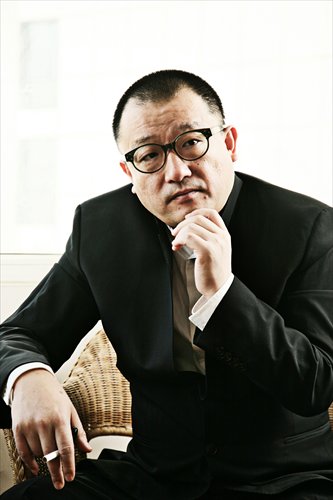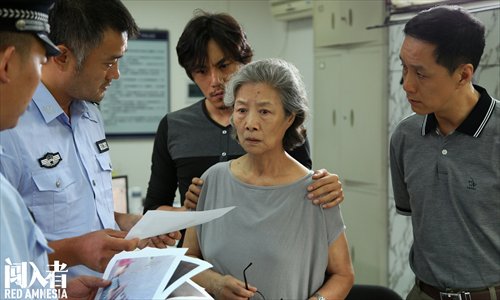HOME >> ARTS
Venice intruder
By Wei Xi Source:Global Times Published: 2014-9-3 20:18:02
Director Wang Xiaoshuai talks about the state of Chinese film

Wang Xiaoshuai Photos: Courtesy of DongChun Films
As the only Chinese film taking part in the Venezia 71 section of this year's Venice Film Festival and the first to enter over the past three years, Wang Xiaoshuai and his suspense film Red Amnesia has gained wide attention at home.
While this is Wang's first film to take part in the Venice festival, he has been a frequent guest to two other renowned European film festivals, wining two Silver Bear awards at the Berlin Film Festival and one Jury Prize at Cannes.
Days before he left for Venice, the 48-year-old Chinese director sat down for a face-to-face interview with the Global Times at his studio in Beijing, during which he talked about his film and shared his opinions about the current state of the Chinese film industry.

A scene from Red Amnesia Photos: Courtesy of DongChun Films
Everyone's an intruder
Red Amnesia, or Chuangruzhe (lit: intruder) in Chinese, is scheduled to be screened in Venice on Thursday. The idea for the film came from Wang's desire to reflect on Chinese society and its people.
"We Chinese are all involved in each change in politics - movement, campaign, or revolution. But we are apathetic during such transitional periods," Wang said, adding that his film is an attempt to figure out how this personality among Chinese was formed. "Over so many years, Chinese have intruded on each other, not only in life but also in our thoughts. The Chinese, for a long time, have lacked independent thought and been indoctrinated."
Seeking an answer, he turned to the members of China's older generation such as his very own mother for study, which is probably why the lead character for Red Amnesia is a retired old woman everyone calls Old Deng (Lü Zhong). In the film, Old Deng begins receiving anonymous and mysterious phone calls, she decides to head back to Guiyang, capital of Guizhou Province, where she volunteered when she was young after the government called on the nation to develop remote and inland areas. While revisiting old haunts with a friend she hasn't seen in years, Old Deng comes to terms with her younger self.
Similar to Red Amnesia, examinations of ordinary people and how their lives adapt to a changing society are frequents themes in Wang's films.
Old Deng's journey was influenced by Wang's childhood experiences. As his parents were one of the many families who joined the "third front construction" movement advocated by the government during the 1960s, the goal of which was to build up the infrastructure of the country's rural Northwest and Southwest, he moved from Shanghai to Guiyang with his parents shortly after his birth.
"There have been abundant and rapid changes within Chinese society. I like to examine these changes to society and their relationship with the people," Wang told the Global Times.
Independent market
Recent reports in the media have divided Chinese directors into two categories: those who are well fed at home and therefore care little for the overseas market, and those who have made a name for themselves at overseas film festivals but whose works do not perform commercially well in China.
Although he is often seen as a representative figure of this latter camp, Wang said he in fact admires commercial film directors.
"It's good China has such a good film market now. It's not easy [for commercial filmmakers] to learn from Western genre films and then adapt them to the Chinese market," Wang said.
While the market is booming when it comes to box office sales, Wang feels there are still problems.
"It's a blind pursuit for box office results. People are competing to see who can take the highest box office record. This insane phenomenon is ridiculous," noted Wang, adding that he feels people should return to a more peaceful mindset when making films instead of being kidnapped by money and box office demands.
Too much focus on the market is one reason, Wang believes, that the living space for independent films has become smaller. He pointed out that the current market is still looking to create more room for commercial films and maximizing profit. As a result, few people think about providing different types of films for different audience members.
However, besides the lack of enthusiasm from businessmen, an even bigger mark against independent films is a lack of government support.
While talking about the sudden shutdown of the 11th Beijing Independent Film Festival two weeks ago, Wang said that authorities in China seem to fear independent films, "as if they were carrying out some kind of conspiracy." Admitting that film censorship barriers have loosened in recent years, Wang said that the attitude of authorities toward what kind of films can get government approval is still very ambiguous. "Sometimes, a film gets approval to participate in a foreign film festival, but when it comes back home to be screened, it may once again become forbidden," he said.
Some opponents argue that filmmakers should blame themselves, because Iran, a country that also has fierce censorship, still manages to produce good films. However, Wang refuted this view saying that this thinking was akin to asking farmers to grow plants of rocks. "We should be provided with good soil," Wang said.
A source of honor and pressure
His first time at the Venice Film Festival, Wang said it is both an affirmation and an honor, but at the same time a source of pressure.
"It will be different from screening a film in a common theater," he predicted. "The moment light first hits the screen, you realize that everything you are is now being presented to the most professional of audiences and judges, who are all artists with sharp eyes. What they are looking for is your film's true art."
Posted in: Film